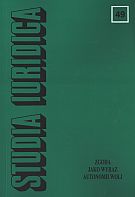AUTONOMIA PACJENTA A WSKAZANIA MEDYCZNE
PATIENT’S AUTONOMY AND MEDICAL INDICATIONS
Author(s): Przemysław Konieczniak, Maria BoratyńskaSubject(s): Law, Constitution, Jurisprudence
Published by: Wydawnictwa Uniwersytetu Warszawskiego
Keywords: autonomia; pacjent; medycyna; autonomy; patient; wskaznania; przeciwwskazania; pacjenta; dobra osobiste; operacja; operacje; legal medicine; forensic medicine; Polish law; law; prawo
Summary/Abstract: The article analyses notions of absolute/relative indications, and absolute/relative contraindications in medicine, as well as their impact on the legal system. These terms commonly appear in description of medical practice and they look to be the basic terms for medicine, but their meaning is usually not defined. Traditionally, indications are recognized as limitations of medical practice; in a paternalistic model of medicine a physician generally was not allowed to undertake not-indicated interventions (as not “objectively best” for a patient). The concept of medical indications might suggest they directly result from laws of nature, but it would be a kind of “naturalistic fallacy”. Indications (resp. contraindications) are dependent on, but not determined by, scientific knowledge. The other factor affecting them is axiological assessment. Both indications and contraindications are a kind of norms (directives for clinical decision making). Like legal rules they have a form of commands or prohibitions. Like legal rules they evolve in accordance with social change. Empirical knowledge and empirical verification of effectiveness/safety of medical procedures themselves do not create norms. The laws of nature may, e.g. describe connection between use of digital and reactions of the cardiac muscle, but do not suffice as a base for any indications; to formulate indications one must first define what is desired (resp. undesired) effect of medical treatment, i.e. a question that natural sciences do not answer Medical indications and contraindications in medicine are human, social, moral or rather philosophical, than „scientific”. Hence, one should not argue some intervention is “morally unacceptable as medically not indicated”; that would reverse premises and conclusions. Medicine in its biological aspect is a technical instrument that makes possible to strive after various purposes, and medicine does not determine which of the purposes are desirable or acceptable. The principle of respect for autonomy has softened the traditional understanding of indications, as a patient is entitled to independent, subjective assessment what serves him good. Additionally, a patient may apply for interventions, which traditional medicine would find obviously not-indicated.
Journal: Studia Iuridica
- Issue Year: 2008
- Issue No: 49
- Page Range: 9-42
- Page Count: 34
- Language: Polish

